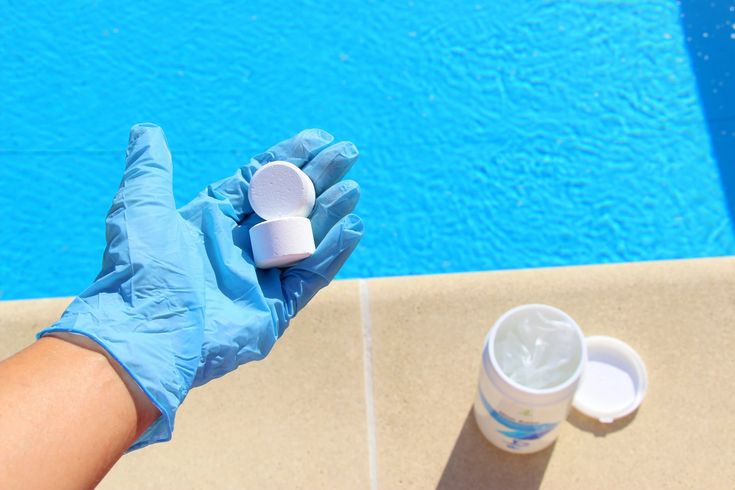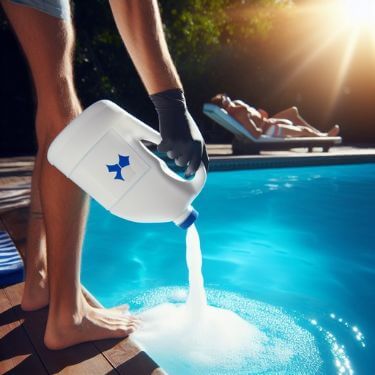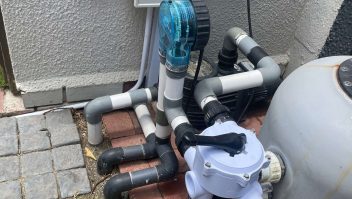

When it comes to keeping your swimming pool clean and safe, choosing the right sanitizer is crucial. South African pool owners often ask: Is chlorine better than bleach for swimming pools? While both options contain similar active ingredients, they differ in concentration, cost, and how they impact your health, pets, and the environment.
Let’s dive into the pros, cons, affordability, and health considerations of bleach vs chlorine to help you make the best decision for your pool.
What’s the Difference Between Bleach and Pool Chlorine?
Both bleach and chlorine rely on sodium hypochlorite, the active ingredient that disinfects water by killing bacteria, algae, and other contaminants.
- Pool Chlorine: Typically comes in liquid, granular, or tablet form and is specifically formulated for pools with higher concentrations (10–12.5% sodium hypochlorite).
- Household Bleach: Usually contains 5–6% sodium hypochlorite and additional additives (like perfumes or thickeners) which may not be pool-safe.
Important: Always use unscented, plain bleach with no added surfactants if considering bleach as a pool sanitiser.
Chlorine vs Bleach: Side-by-Side Comparison
| Feature | Pool Chlorine | Household Bleach |
|---|---|---|
| Sodium Hypochlorite Strength | 10–12.5% | 5–6% |
| Designed for Pools | ✅ Yes | ❌ No |
| Additives | None or pool-safe stabilisers | May contain thickeners, perfumes |
| Cost (ZAR) | R400–R600 per 25L | R50–R100 per 5L |
| Application | Liquid, granules, tablets | Liquid only |
| Environmental Impact | Moderately low if used correctly | Potentially higher due to non-pool additives |
| Health & Pet Safety | Safer when balanced | Riskier due to unknown additives |
Pros of Using Pool Chlorine
- Specifically formulated for pools
Designed for long-term use in all pool types, including fibreglass and marbelite finishes. - Higher concentration = better value
You’ll use less chlorine by volume compared to bleach, reducing frequency and cost over time. - Safe with proper handling
When used correctly, it maintains safe levels of free chlorine and pH balance. - Works well with stabilizers
Pairs effectively with cyanuric acid (stabilizer) to reduce chlorine loss from sunlight.
Cons of Pool Chlorine
- Can be more expensive upfront.
- Requires proper storage due to strength.
- May contribute to chlorine smell and eye/skin irritation if overused.
Pros of Using Household Bleach
- Affordable and accessible
Available at most supermarkets or hardware stores across South Africa. - Easier to dose for small or indoor pools
Works fine in plunge pools or above-ground pools with less volume. - Quick fix in emergencies
If you’re out of chlorine, bleach can help you avoid algae growth.
Cons of Bleach for Pools
- Weaker concentration = requires more volume per dose.
- May contain unwanted chemicals harmful to your pool lining or filtration system.
- Not stabilized, so UV rays from the sun can quickly degrade its effectiveness.
- Higher long-term maintenance frequency.
Affordability Comparison
| ProductPrice Range (South Africa)Usage Efficiency | ||
|---|---|---|
| Liquid Pool Chlorine | R400–R600 per 25L | High |
| Household Bleach | R50–R100 per 5L | Low (you’ll use more) |
While bleach appears cheaper, chlorine often delivers more sanitizing power per rand, making it the better long-term value—especially for larger or outdoor pools.
🌱 Environmental Impact
- Pool chlorine, when dosed correctly, breaks down into salt and water—posing minimal environmental harm.
- Bleach with additives, such as perfumes or surfactants, can be more harmful to grass, pets, and surrounding vegetation if accidentally spilled or backwashed.
To reduce environmental impact:
- Don’t over-chlorinate
- Always dispose of pool water responsibly (consult local by-laws)
🐶👨👩👧👦 Health Considerations for Humans and Pets
| Factor | Pool Chlorine | Bleach |
|---|---|---|
| Eye/Irritation Risk | Low when balanced | Higher if improperly used |
| Pet Safety | Safe at correct levels | Riskier due to additives |
| Skin Sensitivity | Manageable | May increase dryness |
| Respiratory Reactions | Rare unless over-chlorinated | Possible if used improperly |
Pro tip: Keep chlorine levels between 1–3 ppm and pH between 7.2–7.6 for best safety.
Final Verdict: Chlorine or Bleach?
If you own a standard residential pool in South Africa, liquid pool chlorine is the superior choice in terms of:
- Long-term affordability
- Pool material compatibility
- Human and pet safety
- Effective disinfection
Bleach is a good emergency backup or cost-saving option for small plunge pools, but should only be used with caution and never with additives.
Helpful Resources
- Pool Chemical Balancing Guide South Africa
- Plunge Pool Cost and Maintenance Comparison
- Pool Cleaning and Chlorinator Installation Services
External Sources
FAQ: Chlorine vs Bleach in Swimming Pools
Is it safe to use household bleach in a pool?
Only if it’s unscented and plain bleach, and you calculate the correct dosage. Avoid scented or thickened varieties.
How much bleach is needed to sanitize a pool?
It depends on your pool size. Roughly 1L of bleach per 40,000L raises free chlorine by ~1 ppm. Use a pool calculator for accuracy.
Can I switch between bleach and chlorine?
Yes, but you should monitor stabilizer levels and adjust dosing accordingly. Consistency is key to avoiding algae blooms.
Which is safer for pets?
Properly balanced pool chlorine is safer. Bleach may contain additives harmful to pets, especially small dogs or cats.
What if I accidentally use scented bleach?
Drain a portion of the water and refill. Perfumes and additives can affect water chemistry and may irritate skin and eyes.
Call to Action
Need help choosing the right chemicals for your Cape Town pool?
👉 Contact Pools Reno for expert advice, chlorinator installations, and chemical delivery services throughout the Western Cape.



